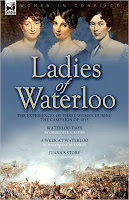In writing Book 2 of my Three Soldiers Series, I’ve again read Waterloo Days on Google Books. The complete title:
Waterloo Days: The Narrative of an Englishwoman Resident at Brussels June 1815 by Charlotte A. Eaton
 (Waterloo Days is one of three memoirs from the Waterloo Campaign included in Ladies of Waterloo)
(Waterloo Days is one of three memoirs from the Waterloo Campaign included in Ladies of Waterloo)
Charlotte Eaton traveled to Brussels with her brother and younger sister, arriving in the the city 194 years ago today. Her narrative of this trip was first printed two years later and again in 1852. It remains a vivid account and an exciting story, with such immediacy it could have been written yesterday.
This week is the anniversary of the Battle of Waterloo, the grand battle that finally ended the reign of Napoleon, so it seemed fitting for me to address what it was like in Brussels on June 15, 1815, three days before the battle.
Here, are Charlotte’s words:
We had not entered the hotel many minutes, and had not once sat down, when we recognised our pleasant compagnon de voyage. Major Wylie, standing in the Place Royale below, encompassed with officers. He saw us, took off his hat, and, breaking from the people that surrounded him, darted in at the door of the hotel, and was with us in a minute. Breathless with haste, he could scarcely articulate that hostilities had commenced! Our amazement may be conceived: at first we could scarcely believe him to be in earnest.
“Upon my honour,” exclaimed Major Wylie, still panting, and scarcely able to speak, from the haste with which he had flown up the hundred steps, “it is quite true; and the troops are ordered to be in readiness to march at a moment’s notice; and we shall probably leave Brussels to-morrow morning.”
In answer to our eager inquiries, he then told us that this unexpected intelligence had only just arrived; that he had that moment left the Duke of Wellington’s table, where he had been dining with a party of officers ; and that, just as the dessert had been set upon the table, a courier had arrived, bringing dispatches from Marshal Blucher, announcing that he had been attacked by the French, but although the fighting was hot, it seemed to be Blucher’s opinion that it would most probably be nothing more than a mere skirmish.
While the Duke was reading the dispatches, the Prince of Orange, General Mufflin, and some other foreign officers had come in. After a short debate, the Duke, expecting that the blow would be followed up, and believing that it was the enemy’s plan to crush the English army, and take Brussels, immediately ordered the troops to be in readiness to take the field at a moment’s notice.
“And when did all this happen? when was this attack made?” we anxiously inquired.
“It took place this afternoon.”
“This afternoon !” I exclaimed, in astonishment, and, I suppose, with looks of consternation, which drew a good-natured smile from Major Wylie, for we had not been used to hear of battles so near, or fought the same afternoon.
“Yes, it happened this very afternoon” said Mayor Wylie ; ” and when the express came away, they were fighting as hard as ever, but after all, it may prove a mere trifling affair of outposts nothing at all.”
“But are the French in great force? Where are they? Where are the Prussians ? How far off do you suppose all this fighting is?” were some of the many questions we asked.
The fighting was in the neighbourhood of Charleroi, about half a day’s march from Brussels; nothing certainly was known of the force of the French. In fact, nothing at all was known, except that the French had this very day attacked the Prussians, when they were totally unprepared, at a short distance from us.
“However, after all, this may end in nothing,”said Major Wylie, after a pause; “we may have to march to-morrow morning, or we may not march these three weeks, but the Duke expects another dispatch from Blucher, and that will settle the business:”
And so saying, Major Wylie went away to dress for a ball. Yes, a ball ! For the Duke of Wellington, and his aides-de-camp, and half of the British officers, though they expected to go to a battle to-morrow, were going to a ball to-night, at the Duchess of Richmond’s; and to the ball they did accordingly go. They seemed to say, or to feel, with the Scottish Chief in Douglas:
Tills night once more
Within these walls we rest; our tents we pitch
To-morrow in the field. Prepare the feast!
Free is his heart who for his country fights:
He on the eve of battle may resign
Himself to social pleasure: sweetest then,
When danger to a soldier’s soul endears
The human joy that never may return.
Would you like to have been in Brussels on June 15, 1815?
What do you think it would have been like to attend the Duchess of Richmond’s ball?
 Visit my website and enter my contest! Next prize (to be chosen today!) is my RITA winner, A Reputable Rake. So hurry.
Visit my website and enter my contest! Next prize (to be chosen today!) is my RITA winner, A Reputable Rake. So hurry.
